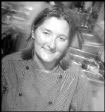A reading by University of Washington teacher and poet Heather McHugh in Seattle is a rare event. She’s better known in the Manhattan canyonlands and along the Charles River. McHugh’s headlining appearance this week at the young and audacious Seattle Poetry Festival will no doubt raise the event’s growing stature as a regional literary occasion.
So why don’t we know her better? “Because,” she says, “Seattle recognizes me as a creature of the forest, and leaves me in peace.”
The rest of the country, however, won’t. McHugh’s leafy perch was threatened last month when she and nine others were elected Chancellors of the Academy of the American Poets (AAP). The eastern literary establishment puts great symbolic importance in the academy, whose membership includes many of the most illustrious US poets.
“The creaky, rusty sound you’re hearing now? That’s the gates of the academy of the future slowly opening,” said Bob Holman, New York’s best-known impresario of poetry slams and co-producer of the PBS series The United States of Poetry.
An organization of poets, of course, is oxymoronic, and maintaining one is like carrying bullfrogs in a wheelbarrow, as the academy’s board can attest. The appointments were a response by the AAP board of directors to a protest that flared up last year when Fred Viebahn, who’s married to former Poet Laureate Rita Dove, attacked the academy for “unapologetic racial ‘purity’ and gross gender imbalance.” Chancellors Carolyn Kizer and Maxine Kumin resigned in sympathy with that view (thus instantly creating a gender imbalance); Mona Van Duyn resigned to protest these protests; the AAP sent form letters soliciting the views of hundreds of poets and critics.
“At first, I just didn’t reply,” says McHugh, who eschews politics. “But by the time they’d bothered to make a third inquiry, I thought: ‘I do, in fact have an instinctive and . . . fierce reaction to all this.'”
McHugh had admired poets like Richard Wilbur and Anthony Hecht, chancellors of the AAP when she was a younger poet. To her, they were heroes because of “their care with the language, the depth of their humanity, and the kind of talent Seamus Heaney says ‘is compounded of energy and artifice.’
“Now that I’m getting old and crotchety,” she says, “I still rather like the thought that there might be some pocket of reverence for elder craftsmen in the language, a chancellorship based only on literary merit and not on gender or race or social engineering. . . . The academy does so many ‘broadening’ things, I thought it right there should be some place exclusively for literary excellence, which is not inherently a democratic notion.”
McHugh objected to increasing the number of chancellors, arguing that “distinction” and “representation” are not necessarily compatible premises. “In the presence of great poetry,” she says, “did it ever really matter . . . what was the age or color or nationality of the one through whom such human musics and insights flowed? The answer is no.”
“Any change,” she wrote, responding to the AAP board, “emphasizing gender, race, or anything but literary merit is misguided,” since “as odious a form of a prejudice as any other was that which imagined all black women would think alike, or all white men.”
McHugh sent the letter off, thinking, “Now my name will be mud in poetry politics.” Next thing she knew, she was named one of 10 new chancellors; the changes she’d objected to already fait accompli. “I fear I’m being invited onto a battlefield where contemplation and writing (my main strengths) are not the point . . . one gets the feeling one was chosen for one’s hormones rather than one’s poems. If they check estrogen levels when we get to New York next November, perhaps I’ll be disqualified.”
At 50, McHugh is as acclaimed as she is prolific. She’s published five collections of verse (with another due in September), one of essays, three translations, and a collaboration of collage and verse with artist Tom Phillips. Her poems have appeared by the hundreds in anthologies and journals, including The New Yorker, Atlantic Monthly, Harper’s, New Republic, and the Paris Review. She was a finalist for the National Book Award for Poetry for her last collection, Hinge & Sign, which was also chosen as the one of The New York Times‘ Best Books of 1994. She’s won the coveted Lila Wallace/Reader’s Digest Writing Award, and some say she’s “on the track” to becoming US poet laureate. Her other honors are too numerous to list.
Critics and fans speak of McHugh’s wit and playfulness, also of her intellect and self-criticism. Linda Gregerson of The New York Times wrote: “If ours were a more reverent country than the one . . . Heather McHugh gorgeously exemplif[ies], long ago [she would] have been made to endure the title of national treasure.” Seamus Heaney speaks of McHugh’s “wonderful fluency and happy skepticism . . . ” Local poet Belle Randall says, “Other poets speak in soliloquy, [while] McHugh is in conversation with the language, performing a ventriloquist’s act, playing straight man to the idiom, its wisecracks, puns, and insinuations. Other poets avoid clich鳬 [but] McHugh dusts them off, makes them new; and made literal, they shine.”
McHugh came to poetry as a child in an embattled family alone in her room with the “miraculous small bearer of world news”—a transistor radio. “When I pressed it to my ear,” she says, “I found I wasn’t alone: I could hear the songs of the other solitaries . . . voices raised in rhythm and blues or country western lament, the plangent saxes and pianos of jazzmen, poignant precisions of the chambered violin.”
In this solitude she found her true family and discovered that it had its counterparts in literature. “Chancing upon such music as ‘And what rough beast, its hour come round at last,/slouches towards Bethlehem to be born?’ I knew at once where a timeless power lay.”
McHugh will read at the Seattle Poetry Festival on Wednesday, May 1, at 7. On the Boards, 100 Roy, 217-9888.







